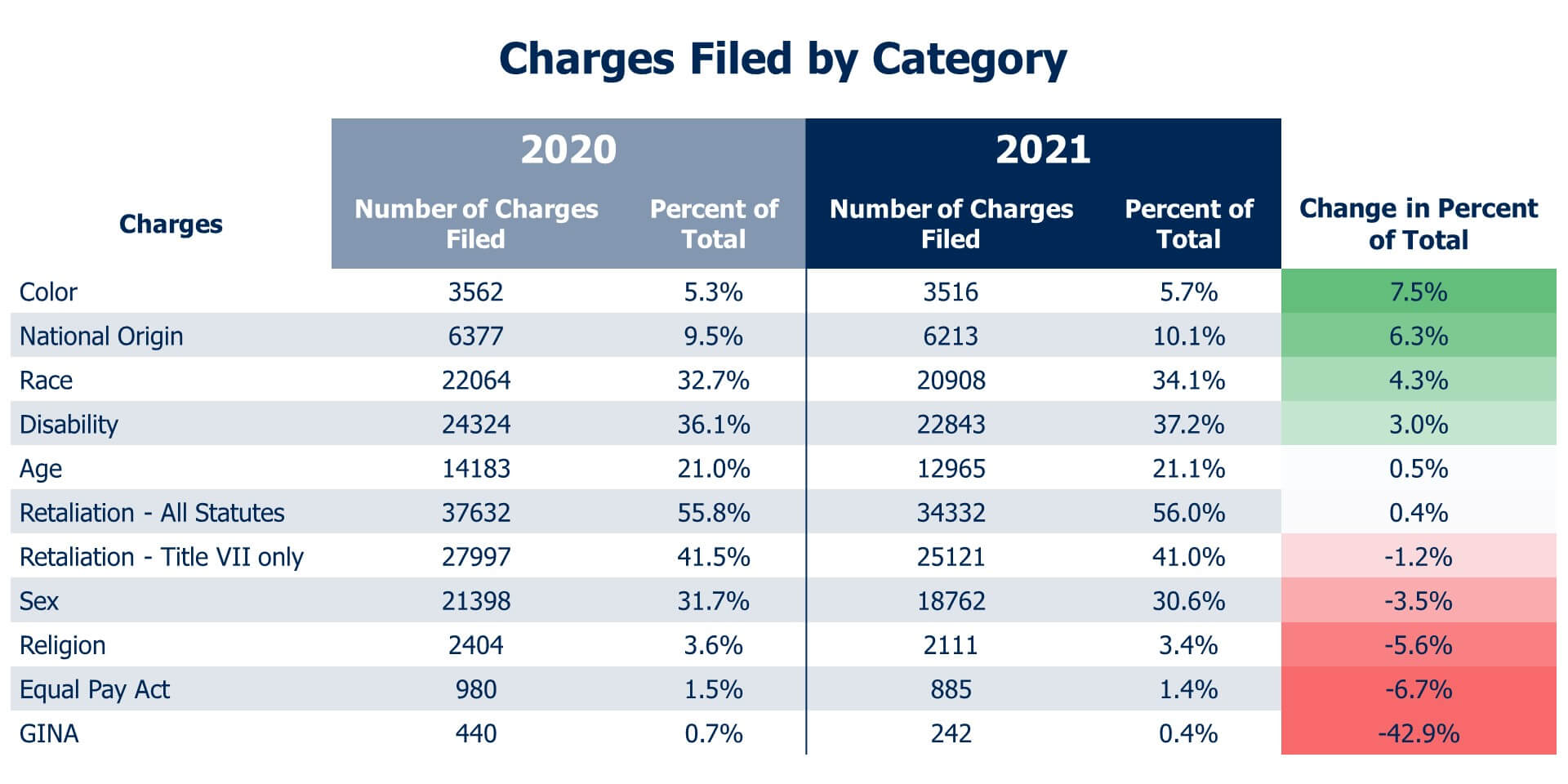On March 28, 2022, the U.S. Equal Employment Opportunity Commission (EEOC) released its Annual Performance Report and Enforcement and Litigation Statistics for fiscal year (FY) 2021 (October 1, 2020–September 30, 2021). As employers navigate the “new normal” of 2022, they might benefit from a glimpse into the agency’s enforcement efforts during the past year, with five top takeaways.
1. Rebuilding Enforcement Capacity
The EEOC framed its FY 2021 as a year of “rebuilding” and strengthening the enforcement capacity of the agency. Filling 450 primarily front-line staff and attorney positions, the agency boosted its ranks, ending the year with more than 2,100 employees. The EEOC recently stated its intention to bolster staffing even further to reach approximately 2,300 employees by the end of FY 2022. Staffing increases, as well as President Biden’s budget proposal of $464.7 million for FY 2023, which is an almost $45 million increase from the $420 million budget recently approved for FY 2022, could mean employers may see an increase in enforcement activity from the agency going forward. Notably, the agency this year attributed an increase in merits findings in favor of claimants—19.2 percent in FY 2021, up from 17.4 percent in FY 2020—to staff having additional time and resources to devote to investigations of charge matters.
The agency also showed signs of increasing its FY 2021 litigation enforcement activities, which had lagged in FY 2020. The EEOC filed 116 merits suits—a 24 percent increase from FY 2020 when only 93 merits suits were filed. However, filings were still down from prior years, for example, when the agency filed 144 and 199 merits suits in FY 2019 and FY 2018, respectively. Additionally, the number of systemic suits filed by the agency remained flat from FY 2020 to FY 2021 at 13.
2. Continued Downward Trend in Number of Charges Filed; Uptick in Pending Charges
The Commission in FY 2021 received the lowest number of charges from workers in more than two decades. The agency received 61,331 charges, a 9.1 percent decrease from the 67,448 charges received in FY 2020. This continues a steady downward trend since 2017 in the numbers of discrimination charges filed with the EEOC. Despite increased agency staffing and a decrease in new charges, however, the number of pending charges increased slightly in FY 2021 to 42,811, a 2 percent uptick from 41,951 in FY 2020, breaking what had been a steadily decreasing private sector charge inventory dating back to 2015.
3. Retaliation—Once Again the Most Frequently Filed Claim
Retaliation continues to be the most frequently filed claim included in charges with the EEOC; 56 percent of all charges filed in FY 2021 included a retaliation claim, and we do not expect that trend to change any time soon.
The interactive visualization below provides information on the frequency of claims filed in FY 2021, as well as historically.
Categories of discrimination claims that showed a slight increase in frequency in FY 2021 as a percentage of the total, as compared to FY 2020, were retaliation, disability, race, color, age, and national origin. By contrast, sex, religion, Equal Pay Act, and genetic information discrimination claims all showed a small reduction in frequency. The EEOC also reported receipt of 3,631 charges in FY 2021 alleging COVID-19 related discrimination, which accounted for 5.9 percent of the total charges received.
The below chart details the number of claims made by category and the percent of the total of number of charges that each category represents.
4. Decline in Overall Recovery; Increase in Monetary Resolution of Charges
FY 2021 saw an overall decline in recovery for private sector claimants, down 14 percent from last year to approximately $385 million. Recovery for claimants in litigation fell sharply from a staggering $106 million in FY 2020 to nearly $34 million in FY 2021. Conversely, monetary resolutions of charges through mediation, conciliation, and settlement increased in FY 2021 to $350.7 million, up from $333.2 million in FY 2020. During FY 2021, the EEOC continued a practice that began in earnest during the pandemic of expanding the use of virtual mediation via video technologies, which contributed to an almost 6 percent increase in successful private sector mediations, resulting in $176.6 million in recovery to claimants, a substantial $20 million uptick over FY 2020.
5. Charges by State—Texas, Florida, and Pennsylvania Again Top the List
Once again, in FY 2021, more charges were filed in Texas than in any other state, with 6,508. Florida came in second with 4,941, and Pennsylvania followed in third with 3,960.
The interactive visualization below shows by state where claimants filed most frequently in 2021, and historically.
Katie Bayt serves as Director of Ogletree Deakins’ EEO Advantage Administrative Charges Program helping employers manage their administrative charges filed with federal, state, and local agencies nationwide. EEO Advantage leverages technology and a thorough understanding of agency processes to manage administrative charges proactively and with budget certainty.






